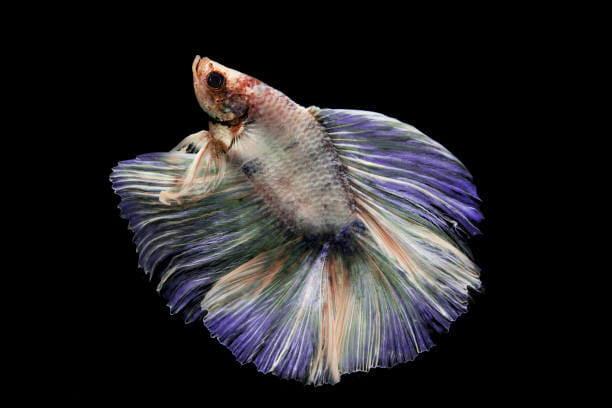Does Betta Fish Change Color: Causes and Prevention Tips
The normal color of betta fish is varying and that’s what makes this species interesting and eye-pleasing. Some betta fish may have darker brown or black markings on their bodies, but these are not always consistent and most betta fish will have some lighter areas on their body. Some betta fish may also have a yellow or orange tinge to their coloration.
Betta fish can change their color over time and there are many reasons why betta fish change color, both in a natural way or unusual manners. Some betta fish will change color when they are stressed or when they feel threatened. Other times, a betta fish’s color may change as a result of its diet.

Table of Contents
Reasons Why Bettas Change or Lose Color
Stress
Betta fish are typically bright, colorful fish. However, some bettas will change their coloration to indicate they are in a state of stress. One of the most common reasons why betta fish change color is because they are stressed. When a betta feels threatened or stressed, its body undergoes changes that can affect the color of its scales and skin. Some signs your Betta may be feeling stressed include: decreased activity, swimming in circles, or exhibiting agitated behaviors such as biting at objects in the tank; changing colors (usually becoming brighter); and breathing heavily. This can include turning a brighter color or having stripes or blotches appear on their body. Bettas may also swim in circles or exhibit other agitated behaviors. If you see your betta changing colors unusually, it is best to take it to a vet for an evaluation.
Environment Changes
One of the reasons why betta fish change color is because their environment changes. Bettas are often very adaptable, so they can usually adjust to changes quickly. However, some drastic environmental changes can cause a betta to change its coloration markedly. For instance, if water temperatures go up or down rapidly or there’s a sudden shift in pH levels (acidity/alkalinity), your Betta may change color as a result of its environment.
Illness
Betta fish can also change color as a result of illness. When a betta is sick, its immune system may start to attack its tissues. This can cause your Betta’s scales and skin to turn an unusual color, which can last for some time after the disease has been treated. In some cases, bettas may also lose their appetite and become thin due to their illness. If you think your betta is sick, please see a qualified veterinarian for assistance.
Aging
As a betta fish’s age increases, its body begins to change color. This is due to the natural decrease in tissue and pigment production as we age. There are several colors that bettas may begin to show as they age including yellow, orange, red, light purple, or maroon; and sometimes all of these colors at once! Color changes usually happen gradually over time so it is best not to be alarmed if your betta changes color slightly during his or her lifetime.
Puberty and Growth
Betta fish undergo a period of rapid growth and physical change during puberty. This includes an increase in body size, the development of secondary sexual characteristics, and a color change. While there is some variation among individual betta fish, most will turn from a light brown or gold to darker shades of brown or black over months.
Genetics
Some bettas change color to show their mood or to communicate with other bettas. The marbled betta is one of these fish that changes color. It has a dark body with lighter stripes running down its sides. When the betta is happy, its colors are bright and colorful. When it’s angry, its colors are darker and more intense.

When to Worry About Color Changes?
If you notice your betta changing color to white and developing lesions, it’s important to get your fish treated as soon as possible by a veterinarian. Here are the most common reasons why:
- Columnaris: It is a condition in which the fish’s skin becomes inflamed and infected. This can be caused by several factors, but one of the most common is poor water quality. When the water contains high levels of ammonia, nitrite, or nitrate, it can cause your betta to turn white and develop lesions on its skin. If you notice your betta changing color and developing lesions, it’s important to get your fish treated as soon as possible by a veterinarian.
- Anchor Worms: The reason why your betta fish is turning white is because of anchor worms. These small creatures live on the substrate of your aquarium and eat the organic matter there. When they consume enough material, they release a white slime that coats the fish’s body and scales. This process can take a few weeks, but will eventually result in a white betta fish!
- Ich: One common question people have about bettas is why their fish is turning white. This can be due to a condition called Ich, which is a parasite that affects the skin and internal organs of Bettas. Ich can cause your fish to turn white and lose its appetite, but it’s not always fatal.
Can Injury Make My Betta Fish Change Color?
Yes, if your betta fish is injured, it can change color due to the stress the injury induces. This includes things like being caught in a net or having its fins pulled out of the water. If you notice your betta fish changing color and developing lesions, it’s important to get your fish treated as soon as possible by a veterinarian.
How to Make Your Betta’s Colors Brighter?
When it comes to Bettas, many people are curious about how to make their fish’s colors brighter. There are a few things that you can do to make your betta’s colors more vibrant. First, make sure that you have a good quality water filter. Second, feed your fish a diet that consists of live and fresh foods. Third, keep your betta in an environment with plenty of light and plants. Lastly, take care of your fish by providing them with adequate water and space.